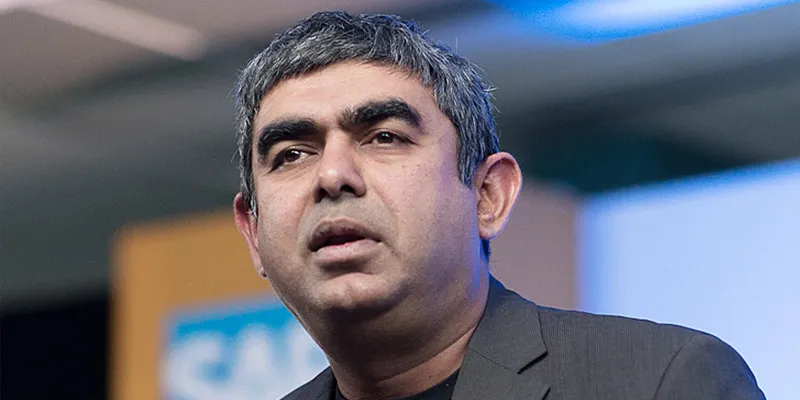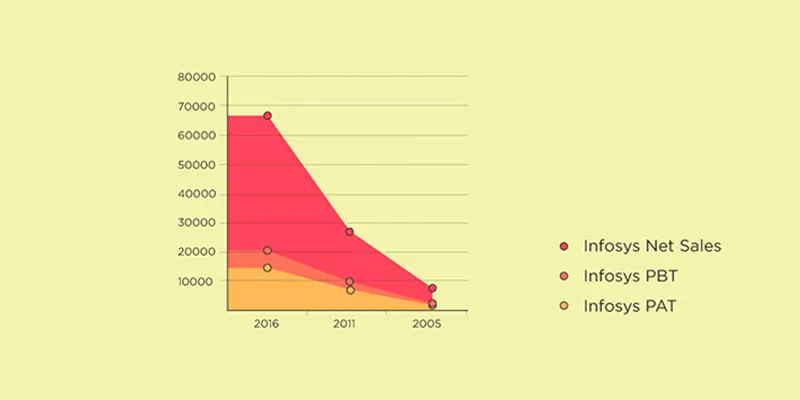The real story behind the Infosys severance drama
Vishal Sikka lives quite the high life at Infosys. Being the CEO, he enjoys several perks, and there is nothing wrong with flying in a private jet to India from Palo Alto, California, on a quarterly basis, and maybe even spending $650,000 on securing his home there. Unfortunately, he has taken over a company whose founders had a frugal past; it was with that frugality that they built a large services company. There are stories of founder Narayana Murthy sharing a room with senior management to save on travel costs, just so that they could invest that little extra. Much of Infosys’ early fortunes were built with frugality.
Even as late as 2005, during a convention at Davos, when Infosys was already worth a couple of billion dollars, the chairman emeritus insisted that his employees share rooms. To top it all off, all appointments in his time were made through the strict scrutiny of the nominations and remunerations committee (NRC). Some may even say that meritorious individuals were not appointed as CEOs of the company. But it was laid down in the company charter that all founders would have a shot at running the company.

When Sikka offered Rajiv Bansal, the ex-CFO, a 24-month severance package, which was kept quiet until recently, the promoter group became suspicious of the governance of the company. Such things simply weren’t meant to happen at the tech giant. NRN has been seeking an explanation for this for the last nine months, and because he has not received a reasonable answer, he has taken the matter public.
Now, the real issue behind the story is still a grey area. One section of Infoscians are blaming the indecisiveness in questioning Sikka over these fat severance packages on non-executive chairman R. Seshasayee.
The trouble began when Prof. Jeffrey S. Lehman, the chairperson of the NRC, did not sign off on the severance package. This is where the promoters, who collectively own 12.75 percent of Infosys, wanted answers, answers that were not forthcoming from the board. "The board of any listed company must answer its shareholders if the matter of severance or a raise is not cleared by the NRC. It is mandatory and laid out by SEBI. But it is also non-binding, because the board need not answer minute details pertaining to the appointment or severance. That is where the problem arises, and most often, these packages are provided under contract during a person's appointment to the company," says Ganesh Prasad, partner at the law firm Khaitan & Co.
The questions on everyone’s mind are whether this was a suo moto payout and whether the CEO asked the board to clear it anyway.
"Shareholders have the right to know what is happening in the company," says Mohandas Pai, MD of Aarin Capital.
But the board of Infosys said in a press statement that it backs Vishal Sikka's vision for the company, and rubbished all media reports about a rift opening up between the company and its promoters.
"The CEO can appoint managers and sever senior employee contracts. It has nothing to do with the financial performance of a company," says Sanchit Vir Gogia, CEO of Greyhound Research.
But things are getting messy for brand Infosys, with the shareholders, promoters and the board not coming together to resolve the issue.

Questions are now being asked about the Infosys acquisition of Skava and Panaya. Sources say that these businesses were acquired at a high value even though they were under performing when compared to their market peers. These companies were acquired for $120 million and $220 million respectively to shore up the platforms and cloud play for Infosys and its platforms company Edgeverve. Infosys is betting big on platforms to fetch them $2 billion in three years. Currently, the revenues of Edgeverve are around $600,000.
Sikka's vision is to make Infosys a $20 billion company by 2020, with $16 billion coming from services and the rest from platforms and acquisitions. In a letter to his employees, he requested them to "focus" and not worry about these events. "Sikka has taken some great decisions to steer Infosys forward. But the board has to answer its shareholders," asserts Mohandas Pai.
A press release sent to the media showed that the Infosys board backed the decision of Vishal Sikka. But whether the NRC, consisting of R. Seshasayee, Kiran M. Shaw, Jeffery Lehman and John Etchemendy, showed oversight in the severance package offered to its ex-employee, or Jeffery Lehman simply disagreed with the others, no one knows. Regardless, the answers need to come out in the open.
Herein lies the summary. The founders of Infosys, including Narayana Murthy, have reiterated that they are completely behind CEO Sikka's vision for the company. But now, a sudden war against the non-executive chairman, R. Seshasayee, has been declared, seemingly throwing a spanner in the works. The road ahead could be more than a little rocky for a company that has been an icon of the Indian private sector for decades.
By the way, Sikka's salary is only $906,000, with the rest, adding up to $11 million, all being variable.







